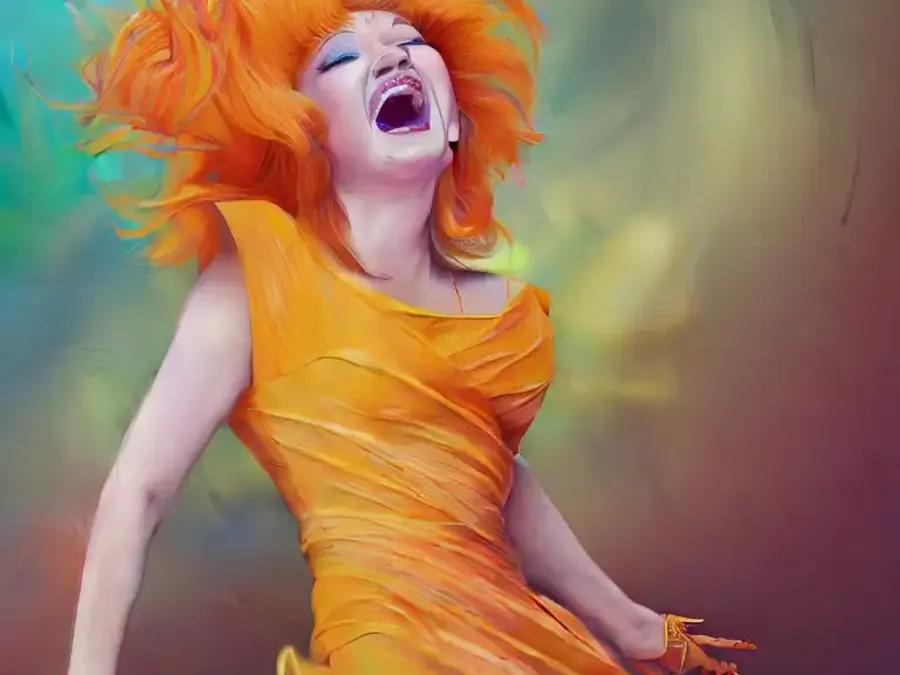Just a Girl

Just a Girl - the No Doubt original
Ah, 1995 was a strange time for me, as the sun started setting on my teenage years. I was all about hard rock, metal, and old blues acts—ignoring R&B, poking fun at the hip-hoppers, and feeling an urge to wrap myself in extra flannel and black jeans whenever techno hit the radio. At least grunge offered some solace in this crazy new world.
Late in that tumultuous year, a song like no other hit my ears, causing an identity crisis. Just a Girl by No Doubt sliced into my consciousness with a sound unlike anything I’d heard before. “Do I hate it?” I asked my naive self, trying to filter the earworm through my identity matrix. No matter how many times I asked, the answer was always a resounding NO!
No Doubt completely shook up the music scene with their third album, Tragic Kingdom. They rode in on a tide of new wave/ska/pop/punk/rock, hitting all the right pleasure centers in my brain and forcing an expansion of my CD catalog.

Just a Girl is an ingenious fusion of styles that births something truly fresh and substantial. At first glance, it may seem like a ditzy little bopper, but a closer look reveals genuine artistry. Let’s break it down: the musicianship and arrangement are top-tier. The song opens with an infectious guitar riff, setting the stage for its rebellious and upbeat vibe. The bouncy rhythm section packs a punch, creating an irresistible groove. And those shimmering, ethereal synths add a touch of sarcasm to the mix. All of these combine, in a way never heard before, to produce a track brimming with a raw energy that constantly drives the listener forwards.
And this is where lead volcalist Gwen Stefani steps in and delivers. Her vocal prowess paints its own picture of repression, exhaustion and resilience. In a single breath, she exudes both vulnerability and strength, hitting us right between the eyes. As a naive and sheltered teenager, I was oblivious to the daily micro-aggressions women faced—a relentless grinding down of their spirits until they succumbed to societal norms. Stefani’s unique blend of sarcasm and assertiveness served as a revelation, unveiling something that had been hiding in plain sight all along.
Just a Girl captures the essence of women’s desire to break free from societal expectations and stand as fully-fledged human beings in a male-dominated world. “Oh, I’ve had it up to here / Oh, am I making myself clear?” It’s a statement that demands to be shouted with a full voice—a statement that should never have to be made, yet one that’s absolutely necessary to vent millennia of frustration. Stefani makes it clear: she won’t be infantilized, and the burden of that is not hers to bear. There’s no apology for existing here, just a powerful assertion of identity.
In this rebellious anthem, No Doubt managed to create something more than just a catchy tune. Just a Girl is an chorus of empowerment, an artistic masterpiece, and a true standout in their repertoire. Stefani’s vocals, the skilled musicianship, and the sharp lyrics all come together to deliver a powerful message. It’s a song that speaks volumes, and it’s a sad indictment no society that it remains as relevant and impactful today as it did when it first hit the airwaves.
Florence + the Machine covers Just a Girl
Florence + the Machine, henceforth Florence, stand out as one of Britain’s most distinctive acts in the past two decades. Their music weaves together indie rock, baroque pop, soul, and folk, creating dramatic and powerful anthems. As a fan, I hold a deep respect for the band, especially the character and strength exuded by lead vocalist Florence Welch. She is one of the only artist’s for whom I will tolerate vocal fry lyric delivery.
Upon hearing that Florence covered Just a Girl, I was initially taken aback. While both Florence and No Doubt are genre-bending bands, their musical roots seemed worlds apart. However, after a moment’s reflection, I realized it could be an ideal fit. Florence has a history of incorporating strong feminist themes into their music, exemplified by the masterpiece King from their album Dance Fever. I had faith that the entire Florence ensemble would craft something unique and profound with this source material.
And they didn’t disappoint. Florence ingeniously deconstructed No Doubt’s classic and rebuilt it in their own image. The track begins with the plinking of a haunted piano, and Welch’s opening vocals convey the weight of the patriarchy that’s crushing her. The first chorus feels lazy yet captivating, mirroring the narrator’s life experiences of her falling apart.

As the second chorus arrives, the track grows in authority and frustration. The narrator breaks free, and the rhythm section tightens up to support her before pausing for breath. The “ooooh oooh” section delves into the narrator’s daily struggle with insanity, only to quiet down as she returns to fit into societal expectations. But not for long. Her strength redoubles, and the song launches her like a missile, seeking out all the unfairness and inequality perpetuated by the patriarchy.
In the fading bars, we feel the resignation of the narrator, who continuously fights for the right to exist, only to be let down by the system once again. The unfortunate truth remains: not much has improved since 1995.
Comparing No Doubt and Florence + the Machine
No Doubt and Florence share the similarity of blending multiple and disparate genres, yet they exude vastly different vibes at the same time. Each band confidently puts their own unique stamp on the track.
No Doubt’s original is playfully biting and resonated perfectly with the ’90s zeitgeist, effortlessly capturing the attention of an ignorant teen like me. On the other hand, Florence took a completely different route, playing to their strengths by creating a cinematic and ethereal descent into madness and frustration. Their subversion of the original is nothing short of brilliant.
There’s no mistaking the two tracks. While they are as different as chalk and cheese, I firmly believe that Florence has remained true to the spirit, emotion, and intention of the original, making it a remarkable and exceptional rendition.
Conclusion
Florence’s cover of Just a Girl is a profound and timely interpretation, bringing new life and relevance to an enduring anthem of empowerment. Welch’s vocal prowess and the band’s musical mastery come together in a spellbinding performance that both honors the original and gives it a fresh and powerful perspective.
Each rendition of Just a Girl is absolutely brilliant and deserves to be cranked up to full volume when it graces the airwaves. If Stefani and Welch ever cornered me and demanded a decision as to which rendition is superior, I’d likely beg for mercy, renounce the patriarchy, and then wake up from my daydream, realizing that neither of them would be concerned about my opinion on the matter.
Since such a scenario will never unfold, I’ll bravely declare that No Doubt takes the cake, but only by the smallest lick of frosting. Both versions are exceptional in their own right, and I’ll gladly listen to each on repeat with equal enthusiasm.
I rate this cover one billion genres blended into one. Amazing!
Rejected art
Please enjoy these rejected cover images for this article.





